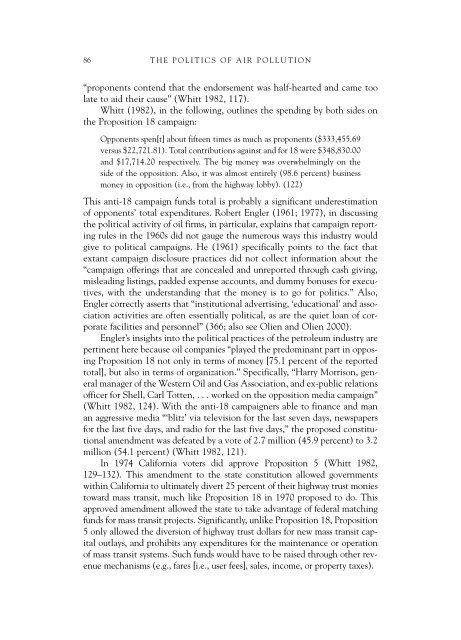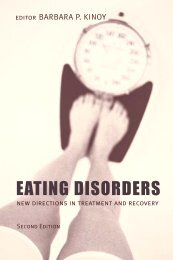AUTOMOBILE EMISSION STANDARDS 85Thus, within thirty years of numerous automotive-related companies,among them General Motors, Standard Oil of California, and Firestone Tireand Rubber, being found by a federal grand jury to have successfully conspiredto dismantle electric streetcar systems in forty-five U.S. cities, including LosAngeles, San Francisco, and New York (Snell 1974; Yago 1984, chap. 4; Bottles1987), a major California city was financing the creation of a fixed-railsystem. As outlined by Whitt, however, this rail system was specifically initiatedand designed to relieve congestion in the central city district, and facilitatetravel to it. It was not a comprehensive effort to provide a citywide publiclyfinanced rail system—one that could free many from the automobile.Proposition 18, however, would have made a substantial amount ofmoney available for the development and operation of mass transportationthroughout the state. This proposition would have allowed the state legislatureto use an unspecified amount of highway trust fund dollars for the purposeof “control of environmental pollution caused by motor vehicles” (asquoted in Whitt 1982, 105). Additionally, “the proposition would have givenvoters in local areas the option of using up to 25 percent of the [the highwaytrust fund] revenues collected in their city or county for mass transit purposes.”Whitt (1982) aptly notes that “Proposition 18 was a mild measure:local voters could elect to continue using all local funds for streets and roads,or could use a maximum of one-fourth of those funds for mass transit” (105).Nevertheless, the proposition created the potentiality of having significantfunds diverted from the highway trust fund toward the building and operationof fixed-rail transportation. The highway trust fund was created in 1938, andis financed through a gasoline tax and automobile licensing fees. Its fundswere constitutionally designated for highway construction and maintenance.Once Proposition 18 received two-thirds of the legislature’s approval asrequired for a state constitutional amendment, it was placed on the ballot.Unlike the BART bond issue, the campaign in favor of Proposition 18 “wasorganized by civic and environmental groups.” Specifically, “the main drivingforces behind the organization of [the pro-proposition] campaign were theSierra Club and TARDAC [the Tuberculosis and Respiratory Diseases Associationof California].” In addition, “the Coalition for Clean Air, representingvarious environmental groups in Southern California, provided volunteerlabor” (Whitt 1982, 107).While a number of organizations expressed support for Proposition 18,including the League of Women Voters, the California Medical Association,League of California Cities, and Californians Against Smog, “virtually allbusinesses that announced a position were opposed.” Joining the AutomobileClub of Southern California and numerous major oil companies inopposition, were the California State Chamber of Commerce, and the CaliforniaReal Estate Association (Whitt 1982, 111–112). Notably, the LosAngeles Chamber of Commerce expressed support for the proposition, but
86THE POLITICS OF AIR POLLUTION“proponents contend that the endorsement was half-hearted and came toolate to aid their cause” (Whitt 1982, 117).Whitt (1982), in the following, outlines the spending by both sides onthe Proposition 18 campaign:Opponents spen[t] about fifteen times as much as proponents ($333,455.69versus $22,721.81). Total contributions against and for 18 were $348,830.00and $17,714.20 respectively. The big money was overwhelmingly on theside of the opposition. Also, it was almost entirely (98.6 percent) businessmoney in opposition (i.e., from the highway lobby). (122)This anti-18 campaign funds total is probably a significant underestimationof opponents’ total expenditures. Robert Engler (1961; 1977), in discussingthe political activity of oil firms, in particular, explains that campaign reportingrules in the 1960s did not gauge the numerous ways this industry wouldgive to political campaigns. He (1961) specifically points to the fact thatextant campaign disclosure practices did not collect information about the“campaign offerings that are concealed and unreported through cash giving,misleading listings, padded expense accounts, and dummy bonuses for executives,with the understanding that the money is to go for politics.” Also,Engler correctly asserts that “institutional advertising, ‘educational’ and associationactivities are often essentially political, as are the quiet loan of corporatefacilities and personnel” (366; also see Olien and Olien 2000).Engler’s insights into the political practices of the petroleum industry arepertinent here because oil companies “played the predominant part in opposingProposition 18 not only in terms of money [75.1 percent of the reportedtotal], but also in terms of organization.” Specifically, “Harry Morrison, generalmanager of the Western Oil and Gas Association, and ex-public relationsofficer for Shell, Carl Totten,... worked on the opposition media campaign”(Whitt 1982, 124). With the anti-18 campaigners able to finance and manan aggressive media “‘blitz’ via television for the last seven days, newspapersfor the last five days, and radio for the last five days,” the proposed constitutionalamendment was defeated by a vote of 2.7 million (45.9 percent) to 3.2million (54.1 percent) (Whitt 1982, 121).In 1974 California voters did approve Proposition 5 (Whitt 1982,129–132). This amendment to the state constitution allowed governmentswithin California to ultimately divert 25 percent of their highway trust moniestoward mass transit, much like Proposition 18 in 1970 proposed to do. Thisapproved amendment allowed the state to take advantage of federal matchingfunds for mass transit projects. Significantly, unlike Proposition 18, Proposition5 only allowed the diversion of highway trust dollars for new mass transit capitaloutlays, and prohibits any expenditures for the maintenance or operationof mass transit systems. Such funds would have to be raised through other revenuemechanisms (e.g., fares [i.e., user fees], sales, income, or property taxes).
- Page 2:
The Politics of Air Pollution
- Page 7:
ContentsAcknowledgmentsviiONELocal
- Page 12 and 13:
LOCAL GROWTH COALITIONS 3tion, such
- Page 14 and 15:
LOCAL GROWTH COALITIONS 5how the U.
- Page 16 and 17:
LOCAL GROWTH COALITIONS 7growth (Ta
- Page 18 and 19:
LOCAL GROWTH COALITIONS 9In this pe
- Page 20 and 21:
LOCAL GROWTH COALITIONS 11ity tend
- Page 22 and 23:
LOCAL GROWTH COALITIONS 13In the ar
- Page 24 and 25:
LOCAL GROWTH COALITIONS 15who reduc
- Page 26 and 27:
LOCAL GROWTH COALITIONS 17cally mod
- Page 28 and 29:
TWOPolitical Economy and thePolicym
- Page 30 and 31:
THE POLICYMAKING PROCESS 21moves to
- Page 32 and 33:
THE POLICYMAKING PROCESS 23eral gov
- Page 34 and 35:
THE POLICYMAKING PROCESS 25groups
- Page 36 and 37:
THE POLICYMAKING PROCESS 27Given in
- Page 38 and 39:
THE POLICYMAKING PROCESS 29tions, t
- Page 40 and 41:
THE POLICYMAKING PROCESS 31the Conf
- Page 42:
THE POLICYMAKING PROCESS 33lars 199
- Page 45 and 46: 36THE POLITICS OF AIR POLLUTIONCOAL
- Page 47 and 48: 38THE POLITICS OF AIR POLLUTIONa go
- Page 49 and 50: 40THE POLITICS OF AIR POLLUTIONrush
- Page 51 and 52: 42THE POLITICS OF AIR POLLUTIONattr
- Page 53 and 54: 44THE POLITICS OF AIR POLLUTIONScot
- Page 55 and 56: 46THE POLITICS OF AIR POLLUTIONthe
- Page 57 and 58: 48THE POLITICS OF AIR POLLUTIONcrit
- Page 59 and 60: 50THE POLITICS OF AIR POLLUTIONwhen
- Page 61 and 62: 52THE POLITICS OF AIR POLLUTIONin t
- Page 63 and 64: 54THE POLITICS OF AIR POLLUTIONThe
- Page 65 and 66: 56THE POLITICS OF AIR POLLUTIONfirm
- Page 67 and 68: 58THE POLITICS OF AIR POLLUTIONinno
- Page 69 and 70: 60THE POLITICS OF AIR POLLUTIONThe
- Page 71 and 72: 62THE POLITICS OF AIR POLLUTIONFHA
- Page 73 and 74: 64THE POLITICS OF AIR POLLUTIONgone
- Page 75 and 76: 66THE POLITICS OF AIR POLLUTIONPres
- Page 78 and 79: FIVEThe Establishment ofAutomobile
- Page 80 and 81: AUTOMOBILE EMISSION STANDARDS 71ext
- Page 82 and 83: AUTOMOBILE EMISSION STANDARDS 73Ano
- Page 84 and 85: AUTOMOBILE EMISSION STANDARDS 75the
- Page 86 and 87: AUTOMOBILE EMISSION STANDARDS 77thr
- Page 88 and 89: AUTOMOBILE EMISSION STANDARDS 79was
- Page 90 and 91: AUTOMOBILE EMISSION STANDARDS 81exp
- Page 92 and 93: AUTOMOBILE EMISSION STANDARDS 83acc
- Page 96 and 97: AUTOMOBILE EMISSION STANDARDS 87A n
- Page 98 and 99: SIXDemocratic Ethics,Environmental
- Page 100 and 101: DEMOCRATIC ETHICS 91At the core of
- Page 102 and 103: DEMOCRATIC ETHICS 93senior attorney
- Page 104 and 105: DEMOCRATIC ETHICS 95ments mount cha
- Page 106 and 107: DEMOCRATIC ETHICS 97frameworks, as
- Page 108 and 109: DEMOCRATIC ETHICS 99mobiles and gas
- Page 110 and 111: DEMOCRATIC ETHICS 101the ecological
- Page 112 and 113: CONCLUSIONPolitical Power andGlobal
- Page 114 and 115: CONCLUSION 105quality became manife
- Page 116: CONCLUSION 107lation, the U.S. econ
- Page 119 and 120: 110THE POLITICS OF AIR POLLUTIONCHA
- Page 121 and 122: 112THE POLITICS OF AIR POLLUTION6.
- Page 123 and 124: 114THE POLITICS OF AIR POLLUTION4.
- Page 126 and 127: BibliographyAcher, Robin. 2001. “
- Page 128 and 129: BIBLIOGRAPHY 119Brienes, Marvin. 19
- Page 130 and 131: BIBLIOGRAPHY 121Cole, Luke W., and
- Page 132 and 133: BIBLIOGRAPHY 123——— . 2002. W
- Page 134 and 135: BIBLIOGRAPHY 125——— . 1975.
- Page 136 and 137: BIBLIOGRAPHY 127Hayward, Clarissa R
- Page 138 and 139: BIBLIOGRAPHY 129——— . 2001. E
- Page 140 and 141: BIBLIOGRAPHY 131——— . 1988.
- Page 142 and 143: BIBLIOGRAPHY 133Perez-Pena, Richard
- Page 144 and 145:
BIBLIOGRAPHY 135Runte, Alfred. 1997
- Page 146 and 147:
BIBLIOGRAPHY 137Tarr, Joel A. 1996.
- Page 148:
BIBLIOGRAPHY 139Wiewel, Wim, and Jo
- Page 151 and 152:
142THE POLITICS OF AIR POLLUTIONChi
- Page 153:
144THE POLITICS OF AIR POLLUTIONTuc









